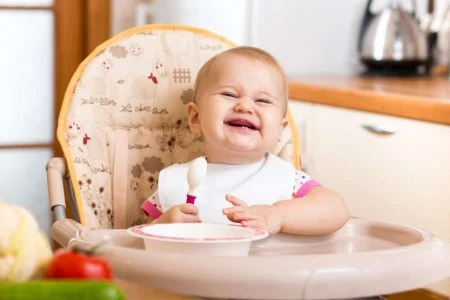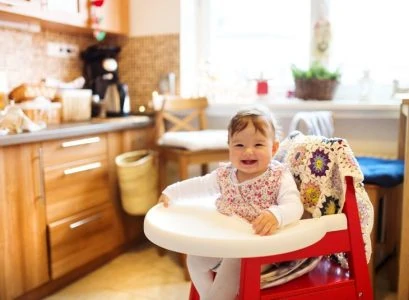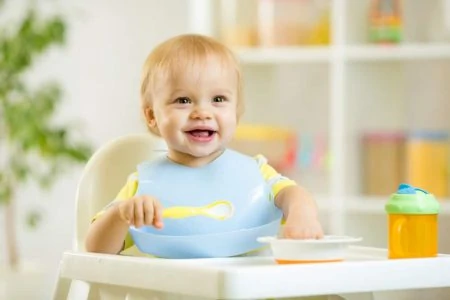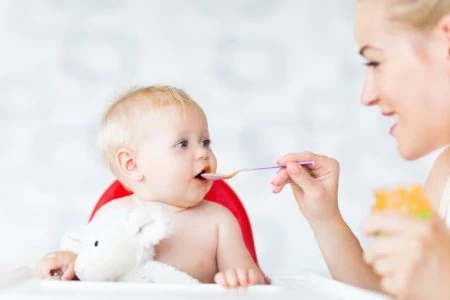As a new parent, you may be overwhelmed with the number of things “they” say you must have to care for your baby.
While there’s no getting around raising little humans without cost, there are some items you can live without. Is the high chair one of those items?
We’re here to discuss the factors you need to consider and help you determine if a high chair is necessary for your baby.
There are many reasons to consider not having a high chair. But while a traditional high chair may not be right for you, your baby does need a place to eat. The best high chairs can be a convenient way to provide that.
How Safe Is It?
Of course, the most important consideration is your baby’s safety. This also applies to feeding. Don’t rely on a seat not designed for feeding and compromise on safety.
Though it may seem easier to use something like a swing, bouncy chair, or Bumbo seat at the table, the risk and safety dangers aren’t worth it.
But high chairs have risks too. Each year, numerous infants are injured while sitting in a high chair, mostly from falls (1).
Here is what you should look for in a high chair:
- Adjustable safety straps (three or five-point harness).
- Safe latches and closures.
- Adjustable seat heights.
- A crotch post.
- No rough edges or exposed hinges.
- Broad, stable base.
- Wheel locks.
We highly recommend checking out our guide to high chair safety to ensure you choose a safe option for your baby. The AAP offers some additional safety recommendations for the use of high chairs.
Do You Have Space?
One of the biggest downfalls of the traditional high chair is how much space it takes up. This is especially true if it’s a full-size model with a tray and if it reclines or has a variety of other features.
If you’re willing to compromise on features such as reclining or having a tray, there are certainly other options available. You could choose to use a booster seat strapped to a regular kitchen chair, so you can remove it as needed.
Before you consider using a booster seat high chair, it is important to be sure your baby has good head control and back muscle coordination. They should at least be able to sit a significant amount of time without the aid of back support (and not fall over while sitting). Booster seats offer minimal trunk support, so these are best for infants closer to a year old.
Editor's Note:
Team Mom Loves BestOne of the first things to decide is whether you want to have a separate feeding tray or if you want them right at the table with the rest of the family. Trust us when we say there will be a mess either way, so it depends on whether you want to clean the same surface or a different one.
Some parents do not find the recline feature necessary and prefer to have the youngest member of the family seated right at the table for meals, so they opt for a space-saving high chair without these features.
As a pediatrician, I do not recommend the recline feature on a high chair. An infant should sit upright for feeding to prevent choking.
Editor's Note:
Team Mom Loves BestAnother consideration is how much storage space your high chair will take up when not in use. Folding high chairs require less storage space, but they still take up some room.
Can You Afford a High Chair?
High chairs can be one of the most expensive items for your baby — right up there with a stroller, crib, and car seat. Given the limited amount of time your baby will use the high chair for, it is tempting for parents to opt for something lower-priced instead.
Of course, just holding your baby on your lap is always an option, but it impedes your ability to eat and can lead to more of a mess.
Similar to the issue of saving space, the portable/hook-on high chair or travel booster seat is an excellent option as they are usually just a fraction of the cost. They are also more versatile as you can use them when you visit restaurants or friends’ houses and continue using them up to age three and beyond.
How Versatile Is the High Chair?
Truthfully, one of the best gifts I received when expecting my first child was our high chair. It’s so versatile; it will grow with my child into adulthood. I’m not kidding – the friend who gave it to us still uses hers from when she was a child, only now it serves as a chair at her desk instead of a high chair.
We love this version by Stokke because its ergonomic design evolves with your child from six months to adulthood. With an adjustable seat and footrest, it’s a solid wood piece. It also has a modern look and a variety of color options.
Because you can use it for purposes besides feeding, we recommend it over the stand-alone high chair which is only useful in the kitchen at mealtimes.
How Easy Is It To Clean?
Most traditional stand-alone high chairs are covered in a wipeable fabric for cleaning. However, the ease of cleaning these is up for debate. Crumbs and stains in all those fabric crevices are unavoidable — especially after daily use with one or more kids.
If you want an easy to clean high chair, we suggest looking at options without fabric. It’s best if they also have a removable and dishwasher-safe tray for occasional quick, deep cleanings.
It’s Your Call
Don’t buy something just because “they” tell you it’s a necessary item. You know your family best, and you are the expert on your baby.
All you need is to provide a safe, stable place for your baby to eat, one that meets your family’s needs regarding:
- Safety.
- Space.
- Cost.
- Versatility.
- Ease of cleaning.
Whether that comes in the form of a traditional stand-alone high chair or another hybrid option is up to you. Whichever form of chair you choose, it is most important that you supervise your baby while they use it to reduce possible injuries.






